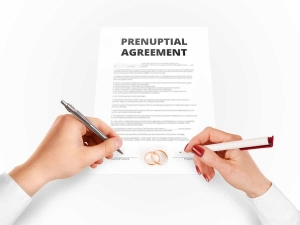Postnuptial agreements, also known as post-marital agreements, are agreements entered into after a marriage has taken place. There are many reasons why a mixed-nationality married couple might wish to draw-up a postnuptial agreement. Among others, a couple that did not sign a prenuptial agreement before marriage may later determine that they want to have some sort of financial plan in place in the event of death or divorce. Additionally, a major change in the financial circumstances of the couple, such as a major career change or inheritance, may alter the financial landscape, requiring a change to the terms of the couple's existing prenuptial agreement to reflect their current wishes, such as the intention of purchasing property in Indonesia.
Indonesia’s 1974 Marriage Law only recognizes prenuptial agreements, ("prenup" for short), a written contract created by two parties before they are married. The 1974 enacted law only discussed the matrimonial agreement that must be drawn-up prior to marriage. Indeed, the law regarding the validity and enforcement of post-marital agreements is not well developed in Indonesia.
But if we dig a little bit deeper, Indonesian Civil Code provides a special provision concerning property division in the course of marriage. The postnup is a product of the ancient Civil Code. It’s been there for many decades. So, some couples have been using these provisions. It just that the postnup is not as popular as its related document, the prenup. In my personal opinion, the postnup is like a fine wine. It’s being kept in the dark, until it matures enough to become something you would like to have dinner with.
What’s a Postnup?
First of all, a postnup is not a back-dated prenup. It is signed and dated after your marriage. When you’re married, you’re married. There’s no way you can turn the clock back after you are already married and get a prenup or even back-date a prenup. That would be illegal under Indonesian law! The harsh reality is that the courts tend to assume that a prenup is always valid, but they have the opposite reaction to the back-dated prenup. The assumption is, in the majority of cases, that this type of agreement is not valid.
You can’t find a postnup mentioned in the 1974 Marriage Law. Nevertheless, just because the Marriage Law doesn’t say anything about the postnup, it doesn’t mean it’s not legal. It’s already exists in the Civil Code. This is can be the ultimate solution for mixed-couples in Indonesia who did not sign a prenuptial agreement before their marriage. This also may preserve the rights of the Indonesian to own property in Indonesia, even though they are married to a foreigner.
The postnuptial agreement may be useful to couples seeking to enter into a post marital agreement after a significant financial change or a period of marital conflict. It is signed and entered into in contemplation of an existing, ongoing, and viable marriage. This agreement allows married couples to legally pre-determine how property will be divided, if the couple divorces.
The postnup creates property separation in your marriage since the signing date, and therefore the community property regime, shall not exist any further. As for the property in existence prior to the postnup, you would need to determine what that encompasses. It has to be separated as well. Then, you need to appoint one spouse as the property holder.
Nevertheless, please take a note that signing a postnup is not the only phase required to create a separation of property during the course of your marriage. Your Indonesian lawyer needs to work on other legal issues such as taking prior legal measures to make sure of the legality of the postnup before it is signed by the husband and wife.
Legal Implications of the Postnup
Legal implications will occur due to property division in the course of the marriage in terms of the two parties in the postnup (i.e., husband and wife), the property in the marriage, and other possible related third parties. Both husband and wife shall be bound by the legal binding force in effect from the Postnup. As it is a legally binding contract, therefore it shall serve as the law between both contracting parties; husband and wife. This is in line with Article 1338 of the Civil Code stipulating that: “All contracts legally drafted shall serve as the law to the parties involved.”
The postnup also takes effect upon third parties. In regards to creditors, the further implementation must be specified in accordance with the time frame. Community property shall be liable to serve as collateral in the event a mortgage exists prior to the postnup date. On the other hand, if one spouse gets a loan from a bank after the postnup date, his/her separate assets shall be in liability to any debts he/she might have created.
Postnup for Mixed-Marriage Couples
In accordance with Article 186 (1) of the Indonesian Civil Code, the wife may, in the course of marriage, request a division of assets, in the following circumstances: "...wife is in imminent danger of losing the security of her dowry and her entitlements pursuant to the law…, and also if ... in the management of the community property, such property might be endangered." This is totally applicable to the circumstances in every no-prenup mixed-nationality married household in Indonesia. By marrying a foreigner, the Indonesian spouse will be precluded to own property, which is her/his right as an Indonesian citizen. Therefore, his/her entitlements to own property in Indonesia may be endangered.
There are many mixed-nationality married couples in Indonesia that did not sign a prenuptial agreement prior to their marriage. In the absence of a prenuptial agreement, by law, their marriage has joint property regime because the Marriage Law - automatically assuming joint property regime within their marriage. This means that either spouse would require consent from the other spouse for every transaction involving immovable property in Indonesia.
Consent is implemented if both parties co-sign every transaction document. In terms of a mixed-nationality marriage, such consent cannot be retrieved from the foreign spouse because a foreigner is not allowed to own property in Indonesia. An Indonesian will not be able to retrieve such consent from their spouse because the foreign spouse is not in the legal position to own the property in the first place. So, the Indonesian spouse is stuck. This is where a prenup is essential to prevent this dilemma.
Since there are many mixed-nationality couples without a valid prenup, then a postnup may be used as one of the options. Writing a postnup, just because you didn’t have a prenup, is not a routine document. Instead of creating an illegal back-dated prenup, I certainly think the postnup is legally worth considering.
Postnuptial agreements are most often used to settle financial matters, including property ownership in mixed-nationality marriages. The postnup is very useful when spouses failed to create a prenuptial but want to protect their assets. It is not something that is common in Indonesia because the law thinks that you should have gotten a prenup in the first place. Therefore, the requirements to establish a postnup are stricter than for establishing a prenup. The contract must be created with full disclosure of all assets, be entered into voluntarily by both parties, and have terms that are fair and equitable.
Why should you get a Postnup?
Because it is dated after your marriage and because it is a legal document. The postnup is about admitting that the Indonesian spouse did not realize that they needed a prenup in order to own property in Indonesia before they married a foreigner. It’s about being honest with yourself and to the public institution where the postnup will be registered. Back-dated prenups are about manipulating the facts of your marriage date, and the date when you signed the prenup.
Postnup are the most favorable choice for the difficult situation of having no prenup in the first place. Some mixed-nationality married couples have resorted to questionable measures, such as making purchases using fake ID cards, or risky purchases, such as buying real property using their relative’s name. You may be trust them, but trust is not the only issue here.
The postnup is about making sure that you control your own property without have to rely on someone else’s mood. With the postnup, you have the power and the authority to make the purchase without being affected by the legal constraints.
What’s Your Marriage Like after the Postnup?
The postnup serves as the law for both contracting parties; husband and wife. After both of you signed the postnup, property shall be separated upon the legal effective date of the postnup. Both spouses shall be independent and will not require consent from the other spouse, including to conduct property transactions. The best part is the Indonesian spouse will no longer be affected by his/her foreign spouse. The rights of an Indonesian to own property are preserved as if you had a prenup from the beginning of your marriage.
Reinstatement of Community Property
You would use these proceedings, if you want to return to the joint property regime, because perhaps the laws may have changed. For example, the Indonesian spouse is no longer affected by being married to a foreigner regarding the ownership of property in Indonesia.
In the event where community property is reinstated, matters relating thereto shall be afforded the same status as that applicable prior to separation, without prejudice to the result of acts carried out by the wife which took place in the interim between separation and reinstatement. Agreement providing for reinstatement of community property by the spouses for any reasons other than those already specified shall be deemed void.
The community property which is dissolved by separation of assets may be reinstated with the consent of both spouses. The reinstatement of community property must be made public by both spouses. Third parties shall not be affected by the reinstatement until the public announcement has been made.
Endorsements from the Jakarta Higher Court
Recent developments related to the postnup have been very important. The latest updates from the Jakarta Higher Court regarding the marital agreement entered into after the marriage. The endorsement from the Higher Court is subject to the following terms and conditions, among others:
- As long as the postnup entered into by husband and wife in accordance with Article 1338 Civil Code, then it serves as the law to both of them. Therefore, the parties in the postnup must perform their rights and obligations as specified in their postnup. In the event one party fails to do so, then the other party may file a complaint to the court of law.
- Furthermore, the Jakarta Higher Court stipulates that the postnup must be dated with an actual date. So, why should you back-dating the prenup in the first place, while you can have an actual-date postnup and legally endorsed by the Higher Court?
- No need to record the postnup on your marriage certificate. Unlike the prenup, the postnup does not require registration at the marriage registry to take effect legally between husband and wife. The postnup automatically valid legally when you covenant and agree to execute its terms and conditions. This must be done freely and voluntarily and free from coercion, duress or pressure of any kind, and they have an adequate opportunity to read and study the postnup.
Legally Recognized by the National Land Registry
In Indonesia, government agency responsible for the titles management of immovable properties in Indonesia is the National Land Registry (so called the BPN/Badan Pertanahan Nasional). Recently, our postnup has been recognized by the BPN. A mixed-marriage couple, a British husband and an Indonesian wife, they were married in July 1993. In the year 2008, she received an inheritance from her father, a house worth more than 15 bio IDR, but was unable to hold it because they didn’t sign any prenup. She nominated her older sister to hold the title of the house. In August 2015, the couple signed our postnup. It took a couple of months for transferring the title. In January 2016, the name of the Indonesian wife was printed on the house ownership certificate. The title of the house is Hak Milik (Freehold Title) and the transfer proceedings were conducted on the certificate of ownership (SHM/Sertifikat Hak Milik) by the BPN in South Jakarta.
So, the BPN recognized her rights as an Indonesian to hold the estate as it is vested by our postnup they signed during the course of marriage. This is of course a very good news for married couples without any prenuptial agreement in Indonesia. I do believe the married couples can thrive in owning the property even without a prenup, and I can say that our postnups have definitely been enriched with the recent developments.
Registration of the Postnups
On May 19, 2017, the Indonesian Ministry of Home Affairs issued a clarification of the Constitutional Court Decision No. 69 / PUU-XIII / 2015 dated October 27, 2016 by which Article 29 of the 1974 Marriage Law was declared unconstitutional. This clarification regarding the registration of postnuptial agreements is in the form of a letter concerning the Recording of Reports of Marriage Agreements No. 472.2 / 5876 / Dukcapil dated May 19, 2017 addressed to the Heads of the Departments of Population and Civil Registry in Regencies and Cities across Indonesia. This letter regognizes the legality of postnuptial agreements for separation of assets. The postnup agreement must be reported to the Marriage Registrar. This is the Civil Registry Office for non-Muslim couples and the KUA for Muslims.
The documents required to be submitted are:
- Photocopy of couple’s identity cards (KTP Elektronik);
- Photocopy of family card;
- Photocopy of notarial deed of marriage agreement that has been legalized by showing the original;
- Excerpts of marriage certificates of husband and wife.
I am Asep Wijaya. Thank you for visiting my blog, and reading my posts.
****
Our thanks to Asep Wijaya, Managing Director of
Wijaya & Co for sharing this information with us!
Disclaimer:
The above is provided for informational purposes only and is NOT to be relied upon as legal advice. This information is not a substitute for the advice of an attorney and should not be construed as a solicitation. No attorney-client relationship is established by use of information found within this article nor in this website.














